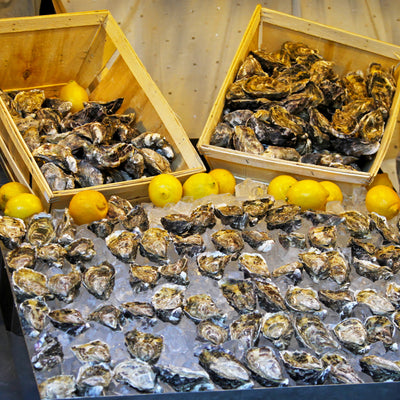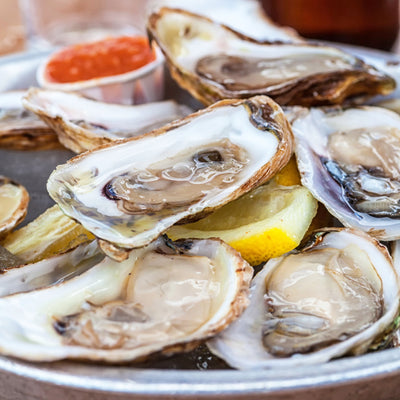Oyster Farming & Economy – A Sustainable Seafood Industry

Oyster Farming & Economy: A Sustainable Seafood Industry
Oyster farming is a rapidly growing industry that plays a crucial role in the global seafood economy. Not only does it provide sustainable seafood, but it also boosts local economies, supports job creation, and contributes to environmental restoration.
As consumer demand for high-quality oysters increases, oyster farming continues to evolve with innovative farming techniques and sustainable practices. In this article, we’ll explore how oyster farming benefits the economy, environment, and seafood industry, along with the challenges it faces.
What is Oyster Farming?
Oyster farming, also known as mariculture, is the practice of cultivating oysters in coastal waters, bays, and estuaries. Farmers grow oysters in controlled environments to ensure consistent quality, sustainability, and availability for seafood markets.
Types of Oyster Farming
There are several methods used to cultivate oysters:
- Bottom Culture Farming – Oysters are grown directly on the seabed, mimicking their natural habitat.
- Off-Bottom Farming – Oysters are raised in floating bags, cages, or trays to protect them from predators and improve water circulation.
- Rack-and-Bag Farming – Oysters are placed in mesh bags and positioned on racks above the seabed to enhance growth and quality.
- Hatchery-Based Farming – Oyster hatcheries breed oysters in controlled settings, ensuring a sustainable and reliable supply.
The Economic Impact of Oyster Farming
1. Job Creation & Employment Opportunities
Oyster farming is a labor-intensive industry that creates thousands of jobs worldwide. The industry provides employment in:
✅ Hatcheries & Farming Operations – Oyster farmers cultivate, monitor, and harvest oysters.
✅ Processing & Packaging – Workers clean, sort, and package oysters for distribution.
✅ Restaurants & Seafood Markets – The demand for fresh oysters supports restaurants, seafood vendors, and distributors.
✅ Tourism & Oyster Festivals – Many coastal towns host oyster festivals and farm tours, driving tourism revenue.
2. Boosting Local Economies
Many coastal communities depend on oyster farming as a primary source of income. In the United States, the oyster industry generates over $200 million annually and contributes significantly to local economies in states like Maine, Louisiana, and Washington.
In addition to direct sales, oyster farming stimulates other industries such as:
- Fishing Equipment & Boat Manufacturing
- Cold Storage & Logistics
- Hospitality & Tourism
3. Sustainable Seafood Production
Unlike many seafood industries that rely on wild harvesting, oyster farming is environmentally sustainable. Oysters are filter feeders, meaning they naturally clean the water while they grow.
This eco-friendly method of seafood production helps reduce overfishing and supports marine conservation efforts.
Environmental Benefits of Oyster Farming
Oyster farming doesn’t just benefit the economy—it also plays a critical role in maintaining healthy marine ecosystems.
1. Natural Water Filtration
🦪 A single oyster can filter up to 50 gallons of water per day.
🦪 Oyster reefs remove excess nitrogen, algae, and pollutants from coastal waters.
🦪 Cleaner water leads to healthier fish populations and improved biodiversity.
2. Habitat Creation for Marine Life
Oyster reefs provide natural shelters for:
🐟 Small fish & juvenile species – Oysters create hiding spots for small fish, helping them survive.
🦀 Crabs & shrimp – Oyster beds attract a variety of crustaceans, boosting local fisheries.
🐚 Other shellfish – Mussels, clams, and barnacles thrive in oyster reef ecosystems.
3. Protecting Coastal Shorelines
Oyster reefs act as natural barriers against coastal erosion and storm surges. By stabilizing the seabed, oyster farms help protect communities from flooding and rising sea levels.
Challenges Facing the Oyster Farming Industry
Despite its many benefits, oyster farming also faces several challenges:
1. Climate Change & Ocean Acidification
🌊 Rising ocean temperatures and increased CO2 levels can weaken oyster shells, making them more vulnerable to predators.
🌊 Extreme weather events, such as hurricanes and rising sea levels, can disrupt oyster farms.
2. Market Demand & Supply Chain Issues
📉 Fluctuating demand for oysters impacts prices and farm profitability.
📦 Supply chain disruptions, such as shipping delays, can affect the quality and availability of oysters.
3. Regulatory Challenges
⚖️ Oyster farms must comply with strict government regulations to ensure food safety and environmental protection.
⚖️ Licensing and water quality monitoring can be expensive and time-consuming.
Where are Oysters Farmed?
Oyster farming is popular in coastal regions worldwide. Some of the top oyster-producing areas include:
United States:
- East Coast – Maine, Virginia, and Massachusetts (Maine Oysters, Tidepoint Oysters)
- Gulf Coast – Louisiana, Texas (Willapa Bay Oysters)
- West Coast – Washington, California, and Oregon (Miyagi Oysters)
Global Oyster Farming Regions:
- France – Known for its premium Belon oysters.
- Japan – Produces high-quality Kumamoto and Miyagi oysters.
- Australia & New Zealand – Famous for their Sydney Rock oysters.
To explore premium oysters, visit Global Seafoods.
FAQs About Oyster Farming
1. How long does it take for oysters to grow?
📌 Oysters take 12 to 36 months to reach market size, depending on the water conditions and farming method.
2. Is oyster farming profitable?
📌 Yes, oyster farming can be highly profitable when managed correctly. It requires initial investment but offers high returns due to the increasing demand for premium seafood.
3. Are farmed oysters safe to eat?
📌 Absolutely! Farmed oysters are regulated for food safety and often cleaner than wild-harvested oysters.
4. Can oyster farming help the environment?
📌 Yes! Oyster farming improves water quality, enhances marine habitats, and protects shorelines from erosion.
Conclusion
Oyster farming is a thriving industry that benefits both the economy and the environment. By creating jobs, supporting coastal communities, and producing sustainable seafood, oyster farming plays a crucial role in the global seafood market.
As demand for fresh, high-quality oysters continues to grow, sustainable oyster farming will remain an essential part of the seafood industry. Whether you’re a seafood lover, a business investor, or an environmental advocate, oyster farming is an industry worth supporting.
Explore Premium Oysters Online
For the freshest, sustainably farmed oysters, visit Global Seafoods. Browse top selections, including:
🦪 Maine Oysters
🦪 Miyagi Oysters
🦪 Willapa Bay Oysters
🦪 Cliff Point Petite Oysters
For more seafood insights, visit Global Seafoods' YouTube Channel!
🔗 Order now and experience the finest oysters from sustainable farms! 🦪
Also in News

How to Make Sea Bream Sushi With Dry-Aged Tuna & Crab Roll — Step-by-Step With Chef Joshua
A complete guide to making Sea Bream sushi at home, including filleting, curing, slicing, and building a Dry-Aged Tuna & Crab sushi roll. Chef Joshua shares professional tips for restaurant-quality results.

Cooked Crab for Game Night: Everything You Need for a Perfect Seafood Party
Take your game night to the next level with a Cooked crab party. Learn the best recipes, cooking tips, and hosting hacks for a memorable seafood feast.

Steam Crab for Date Night: A Romantic Guide to the Perfect Seafood Feast
Make your next date night unforgettable with a romantic Steam crab experience. This guide covers everything you need to know, from ambiance to the best crab varieties.






